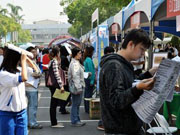
|
 Economic human rights decline in Taiwan: survey Economic human rights decline in Taiwan: survey
Taipei, Dec. 3 (CNA) More than half of the respondents to a recent poll described themselves as satisfied with human rights in Taiwan, seeing progress in the rights of women and indigenous people, but feeling that their economic and judicial human rights have declined, according to the survey results released Friday.
The Chinese Association for Human Rights (CAHR) conducted the survey from September through November this year, collecting 1,084 effective samples on their views of the human rights situation in 11 areas, including politics, judicial affairs, women, children, indigenous people, the disabled, the environment and economics.
In addition, the association gathered opinions from 180 scholars and academics on the same questions.
The survey found that 66.8 percent of the respondents gave a negative evaluation of their economic rights, the highest ratio among all the negative views.
Of the three questions in the economic rights category, "government role and economic human rights" got a lower score than last year, while "consumer rights" and "production and employment" were given better grades than in last year's survey.
Professor Chu Mei-li of National Chengchi University said most scholars also give a minus score for the government's role in protecting people's economic rights, and she further said it is time that the government put forward a viable economic policy to address people's worries.
Another area that received poor comments was the judicial category, with 44.9 percent of those surveyed saying people's judicial human rights have declined compared with last year and only 24.6 percent feeling that they have improved.
Chen Jung-chuan, professor of law at National Taipei University, said that although people can feel the government's determination to reform the judiciary, its efforts still got negative comments.
He cited for example that jailed former President Chen Shui-bian is incarcerated in a 1.2-ping (one ping is equal to 3.3 square meters) cell with another jailbird, which he said shows that there is a shortage of prison facilities.
About half of the respondents gave a positive comment on their political rights, while the other half gave exactly the opposite view, indicating the polarized nature of the country's politics.
All other areas, such as labor, culture and education, and senior citizens, received overall positive comments.
The CAHR was set up in 1979 to secure, facilitate and promote human rights based on the respect of their values acknowledged in the Universal Declaration of Human Rights.
(2010-12-3/Focus Taiwan News Channel)
|





